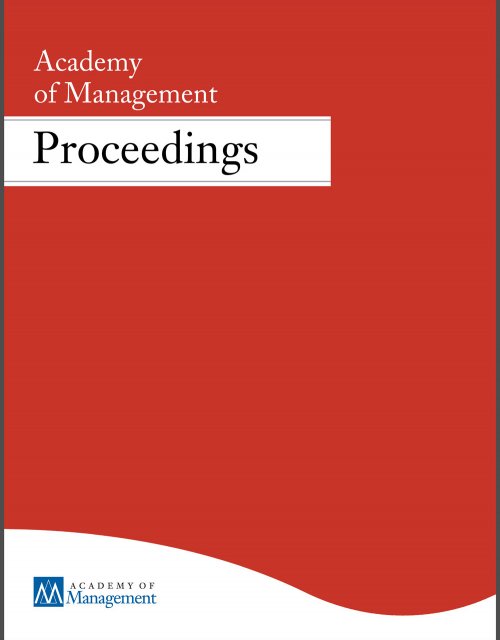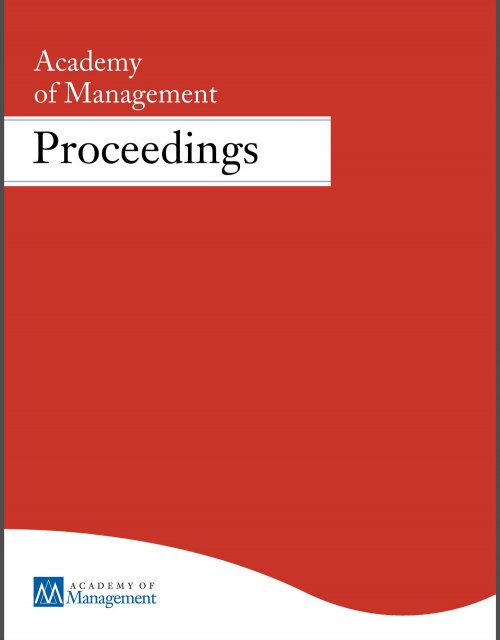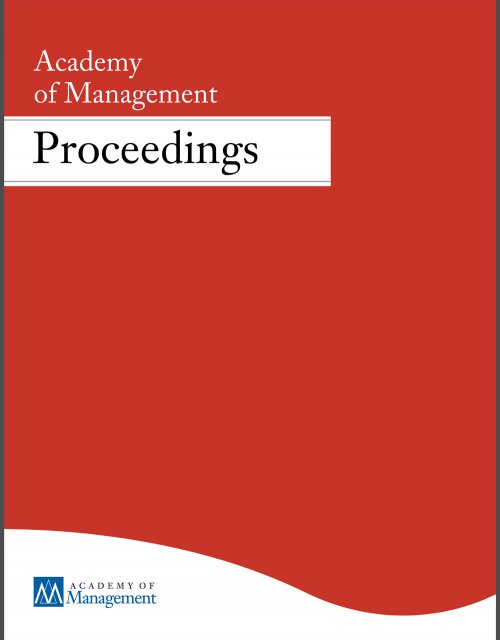Publication records
Subject(s)
Management sciences, decision sciences and quantitative methods
Keyword(s)
Management science, research
JEL Code(s)
M00
Journal Pages
96–97
Subject(s)
Marketing
Keyword(s)
Personal selling, customer relationships
JEL Code(s)
M310
Subject(s)
Economics, politics and business environment
Subject(s)
Technology, R&D management
Keyword(s)
Crowdsourcing, innovation, search
Rejections are common in everyday life, yet their consequences for individual behavior remain little studied. We examine a situation in which organizations invite people outside their boundaries to provide suggestions for formal action. Organizations that receive such suggestions can choose to act upon them, ignore them, or even reject them. While rejections carry a cost (i.e., potentially alienating the suggestion-maker), they are also an important source for motivation and learning. We unite these opposing views and argue that rejections can under certain conditions increase effort; moreover, we document how people learn by changing their behavior when trying again.
With permission of the Academy of Management
Volume
2015
ISSN (Online)
2151-6561
ISSN (Print)
0065-0668
Subject(s)
Human resources management/organizational behavior
Keyword(s)
Error management, leadership
Errors are ubiquitous in organizations and may develop in catastrophes for the society at large. Leaders and top leaders are directly concerned as they are responsible for the errors of their organizations in addition to their own. Yet the role of leadership in handling organizational and managerial errors has been seldom explored. This panel will engage the audience with a series of insights: a) what may be expected from leaders in the management of errors; b) antecedents and outcomes of effective leadership behavior in error management; c) vivid examples of organizations where leadership issues are integrated in the management of organizational errors. The panel is composed of five scholars originating from as many countries. With expertise on industries - healthcare, aviation, nuclear energy - where errors may have severe consequences, it will propose an interactive debate that is relevant to both scholars and practitioners.
With permission of the Academy of Management
Volume
2015
ISSN (Online)
2151-6561
ISSN (Print)
0065-0668
Subject(s)
Human resources management/organizational behavior
Keyword(s)
Crisis management, mindfulness, resilience
It is time to rethink and reframe crisis management. The literature in this crucial domain of organizational research and practice is missing the mark. Whereas much of the research is focused on the large-scale crises that blindside companies, the reality in today’s business environment is quite different. True, some organizations experience large-scale crises to which they must respond. But, crises are relative to what organizations expect will not fail; almost all organizations experience much smaller-scale crises on a day-to-day basis. And while these events may not cost lives, they can affect market shares, legitimacy, careers, and livelihoods. If we take seriously the idea that the meaning of a crisis is contextual; then it is crucial to better understand how crises originate in the "crucible of the quotidian" (Taylor & Van Every, 1999), in the organization’s day-to-day recurring events. And it is equally important to understand the role that resilience can play as a possible critical "antidote." Reframing the crisis management literature around resilience encourages scholars to rethink crisis and consider a much broader domain of literature and empirical evidence. It also helps to more centrally situate the work and corresponding contributions in organization theory from the periphery where it has lingered for decades despite increasing attention in the business world. By bringing together an internationally recognized group of scholars who have studied crises big and small, this symposium will take a significant step in advancing knowledge and provoking new directions in crisis management research.
With permission of the Academy of Management
Volume
2015
ISSN (Online)
2151-6561
ISSN (Print)
0065-0668
Subject(s)
Finance, accounting and corporate governance
Subject(s)
Human resources management/organizational behavior; Marketing
Keyword(s)
Sales management, motivation
JEL Code(s)
M310


